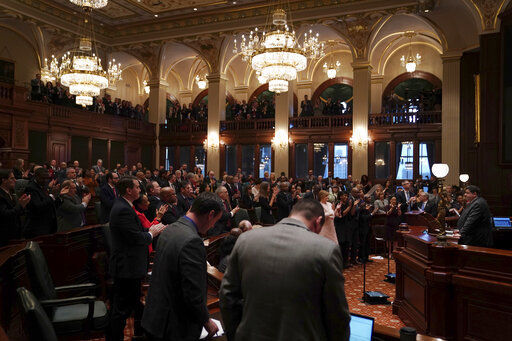Should Illinois split from Chicago? These residents are gathering signatures

Gov. J.B. Pritzker delivers the State of the State address in Springfield on Wednesday. Two efforts are underway to split Illinois into two states.
E. JASON WAMBSGANS, CHICAGO TRIBUNE
BLOOMINGTON — Collin Cliburn works as a carpenter in Athens, a city of about 1,900 in southern Menard County, but his latest project involves cutting of a different kind.
Cliburn is part an effort to slice Illinois into two states, with Cook County as one and everything else as another. The way Cliburn sees it, the state’s Democrat-dominated northeast corner has had outsized influence, with treacherous results.
“I’m impacted severely by every decision these guys are making,” he said.
The long-shot divorce by downstate residents isn’t a new concept, but recently a resurgence has popped up in counties such as Cumberland, Douglas and Shelby. The goal is to add the question to the ballot and let residents decide.
The Effingham County Board was the first to approve adding the referendum, and other boards such as Massac and Fayette counties have followed suit successfully.
Shelby County resident Jeremy Williams has been collecting signatures. Another dozen people are working with him.
“You will find corruption anywhere,” Williams said. “But it seems to be more prevalent and pronounced in Chicago, and we feel like that is probably driving some of the representation, some of the policy, some of the tax initiatives that go on, so we would rather be free from that.”
Another group, called New Illinois, is working to constitutionally separate the state.
Cliburn is head of Illinois Separation and began his social media page empire and brand after a longtime displeasure with politics in the state, specifically in Chicago and Cook County. His efforts have spread through different Facebook pages, one for each county in the state.
Cliburn cited Article 4, Section 3 of the U.S. Constitution, which says a resident can form a new state with approval from state legislatures and Congress. He and the Illinois Separation supporters are open to splitting constitutionally, but he said they’re open to trying other techniques successfully used in the past. He gave the example of West Virginia breaking off from Virginia, a separation that was successful, but technically unconstitutional.
Kentucky and Maine also were created through similar efforts, and there have been numerous proposals in other states, from breaking off South Florida from the rest of the state to creating a new one by combining Delaware with parts of Maryland and Virginia.
The 51st state
Several bids also have been made in Illinois over the years, including one in the 1970s by the “Republic of Forgottonia” in the western portion of the state.
Most efforts have focused on the political, economic and cultural differences between the Chicago area and the other mostly rural counties, and how local residents are represented.
Cook County, home to the third most populated city in America, represents about 40 percent of the state’s population, and five of the six executive state offices are occupied by Chicago residents. House Speaker Michael J. Madigan also is from Chicago and the new Senate president, Don Harmon, represents the Chicago suburbs. All also are Democrats.
And while Republican lawmakers dominate many of the downstate seats, because of lopsided population of the Chicago area, the General Assembly has long been controlled by Democrats. That’s been the source of continued friction on key issues such as gun control, abortion and spending.
The issue has long frustrated state Rep. Brad Halbrook, R-Shelbyville. He refiled legislation last year to get Congress to make Chicago the 51st state. He had six co-sponsors.
“The reason for the resolution HR101, is just because of this growing divide between rural and urban,” Halbrook said. “It’s really about the lack of representation.”
Chicago lawmakers approve bills downstate residents don’t resonate with, Halbrook said, giving the minimum wage increase as an example. “They include us in that, and those aren’t problems for us.”
He said the majority of representation comes from such a small geographic region and they just “drown out the rest of us.”
Ed Luth is one Douglas County resident who has been collecting signatures and is hopeful the county board will vote on the matter.
“The main thing is not having our voice heard, and I think enough people are getting their toes stepped on,” Luth said.
A petition-signing event is planned Feb. 22 at the Tuscola Community Building, 122 W. North Central Ave. Douglas County needs 509 signatures to push the referendum on the ballot.
He said he’d like a government who doesn’t wastefully spend or enact unnecessary laws.
“I want to see our new state fiscally responsible,” Luth said.
Population consideration
The Effingham County Board voted in April to include the question on the March ballot. Voters will be asked: “Shall Effingham County collaborate in discussions with the remaining 101 counties of the state of Illinois, with the exception of Cook County, the possibility of forming a new state and ultimately seeking admission to the Federal Union as the 51st state, pursuant to the provisions of the United States Constitution?”
The board in 2018 also made Effingham County a “sanctuary” for gun owners, telling its employees not to enforce any new Illinois law that would “unconstitutionally restrict the Second Amendment.” The vote brought national media attention.
“I feel like Effingham has leaps and bounds above other counties in their thinking,” said Lorri Dunn, who is collecting signatures in both Cumberland and Clark counties.
She said Cumberland County has enough signatures, which will show officials the community’s support.
“It lets the county board know that the community is definitely interested in having that on the ballot,” Dunn said.
She plans to turn the signatures into the county clerk, however Dunn would additionally like to present the signatures to the county board.
“I think that we’re in trouble,” Dunn said. “The people of southern Illinois, Central Illinois, we have different beliefs than Chicago. I feel like the beliefs aren’t being heard.”
Cumberland County Board Chairman Roy Clapp said the board hasn’t come to a position on the matter, but he has been in contact with Dunn.
Halbrook, along with Rep. Blaine Wilhour, R-Beecher City, is also holding a meeting in Greenville as well.
The Fayette County Board in September approved adding a referendum to the 2020 General Primary Election Ballot in a 12-1 vote, with one member being absent. The Massac County Board voted Tuesday to approve the referendum be added to the November ballot. County boards in Marion, Jefferson, White, Johnson and Pope counties have also approved.
Separation supporters understand this is a long process, but are hopeful for a brand new start.
“What I see happening is a state that will enact more business-friendly policy and it will attract business and attract citizenry instead of repelling them,” Williams said. “The out-migration will hopefully stop and we will regain some of what we lost. I also look forward to downstate values and rural values being better represented.”
Contact Kennedy Nolen at (217) 421-6985. Follow her on Twitter: @KNolenWrites


